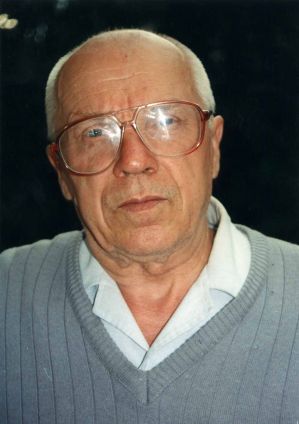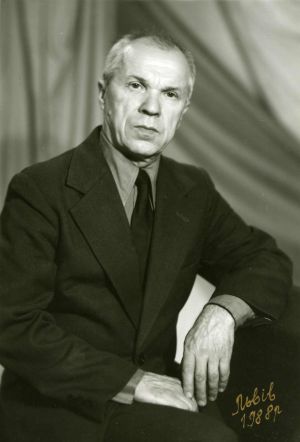

I.O.Kandyba: I was born in the Village of Stulno, Volodarsky[1] Powiat, now Poland, on June 7, 1930.
At the age of seven years, as usual, I entered a primary school and studied there until I finished the fourth grade, because in our village there was no fifth or sixth or seventh grade at the school. Therefore for four years I was a fourth-grader. I went to school in order not to stay at home. However, since my childhood I became a shepherd at the age of six years. There was nobody to pasture the cows, and our grandfather had a farm to go about. He was a peasant of average means. He had ten hectares of land. I was a shepherd. I pastured cows and attended the village school. The seven-grade school was about seven kilometers away. I did not go there.
V.V.Ovsiyenko: And your village, was it entirely Ukrainian?
I.O.Kandyba: Let’s say, ninety-five percent Ukrainian. It was a small village: about a hundred or so khatas. Of these, there were only about five Polish families. But they spoke our language. In schools Polish was the language of instruction.
V.V.Ovsiyenko: It follows that you went to a Polish school?
I.O.Kandyba: Right, to a Polish school. It was Poland at the time.
V.V.Ovsiyenko: I wonder what was the attitude of Ukrainian peasants towards the Polish language and Polish state.
I.O.Kandyba: At school Polish was the language of instruction, nobody used Ukrainian. We were even punished. For example, if we were playing football or volleyball during the recreation and pronounced a word in Ukrainian, we were punished. I also used to repeatedly catch it: I was forced to my knees or kneel on scattered buckwheat, or even clipped on the back of my head. Several times I was punished… I was considered one of the first in my class. My father trained me so that when I entered the school, I was able to read and write. I remember how my teacher−her name was Emiliya Moskaliuvna−even praised me, “Oh boy, Yasik−she called me Yasik−you’re real good at learning”. So I was an overachieving pupil.
V.V.Ovsiyenko: And about your parents? When was your father born? What did he do for a living?
I.O.Kandyba: My father was a villager. My mother was also a villager. She lived in the same village. My father, Kandyba Olexiy Ivanovych, was born in 1902. I’m Ivan Olexiyovych and he was Olexiy Ivanovych. My mother’s name was Olga, patronymic Ivanivna.
V.V.Ovsiyenko: And what was her maiden name?
I.O.Kandyba: Bubela. Her maiden name was Bubela. She was born in the same village in 1911.
V.V.Ovsiyenko: Were they educated?
I.O.Kandyba: They had rural education. At the time it meant two or three grades. Well, maybe it was even four. They were born under Tsar. My mother also finished a few classes, I do not know exactly how many.
V.V.Ovsiyenko: What plot of land did they own?
I.O.Kandyba: Only my grandfather had ten hectares of land. Besides my mother, my grandfather had another daughter, the youngest one, Mariya. And one daughter died in childhood. And there was a youngest daughter, Olenka. She died as a teenager she was approximately fifteen years of age. This much is about the family of my grandfather. My grandfather’s name was Ivan Bubela, surname Mykolayovych. I know nothing about my grandfather’s family, because he was from another village, about ten kilometers away I have never been there. My mother’s mother was Anna Prus from the Prus family. My grandmother was born in 1888, and my grandfather Bubela was born in 1887. He was a year older. This much is about family tree. I even happened to know my grandmother’s mother that is, she was my great-grandmother. I remember my great-grandmother. She died sometime in 1945. She was very old I do not know how old she was indeed.
V.V.Ovsiyenko: And when were your parents married? Did you have any siblings?
I.O.Kandyba: My father had three brothers. The eldest was Stepan, then Andriy, then my father Olexiy, and the youngest was Pylyp. All of them finished the likely common rural schools, and the said Pylyp (junior) was the most teachable. He graduated from the seven-grade which was situated in a nearby village. The villagers considered him a literate person. And he was the one who went in for politics. He went from Poland to the Soviet with the aim to study there somewhere about in 1928. He was a revolutionary soul. And they shot him there for some cause. We could not get to know for what, although my father wanted it very much. He studied in Kharkiv… I do not know the name of the higher college. Anyway he was sentenced to be shot in 1937. It was the time of persecution of intelligentsia.
V.V.Ovsiyenko: Yes, there were many of those who went to the Soviet and found there their grave.
I.O.Kandyba: Right you are…
V.V.Ovsiyenko: Now, please tell me about your family and your parents. When were they married?
I.O.Kandyba: I was born in 1930, I was the senior. I had a brother by name of Stepan he was born in 1932.
V.V.Ovsiyenko: Why do you say about him in the past time? I remember that you wrote him letters from the Urals.
I.O.Kandyba: Yes, I wrote him letters. I came back to him in 1988… At the time you (and Mykola Horbal.